- Home
- Madeleine Roux
Tomb of Ancients Page 2
Tomb of Ancients Read online
Page 2
Sometimes it was quite easy to forget that he was Dark Fae like me, and that he could transform into a massive, shaggy jackal at a moment’s notice.
Mary, however, reflected my nervousness. She made a wobbly curtsy, nearly dropping her shawl as she did so. It was my first ball, and a bundle of nerves gathered in my chest, a cruel reminder that I had been born in obscurity, poverty, and that my name—Louisa Ditton—meant nothing to the sleek aristocracy gliding across the parquet.
“Miss Louisa, I was so very pleased to discover that you and your . . . charming family would be joining us this evening.” With pinched, rouged lips, Lady Thrampton stumbled over the word charming. She obviously meant bizarre. No group of people could look less alike than we three. “Miss Black spoke so sweetly of you, and I understand you recently resided in Yorkshire?”
I felt the urge to fiddle with my skirts but forced my hands into a tidy bundle at my waist, trying to appear prim. “Indeed!” Good start, a little too enthusiastic. “We decided to abandon country life for something more exciting. There are only so many birds one can shoot before it all becomes a dull affair.”
Khent quietly cleared his throat.
“And you are unmarried?” Her lip curled at this.
Mary fidgeted at my side. I glanced at her, but she offered no help, her eyes huge with terror, as if this rich woman were a bear rearing up on hind legs and not a frail dowager. “I have . . . only just come into my inheritance. The business of matrimony can perhaps wait until I am more comfortably settled.”
“An inheritance!” And now Lady Thrampton’s eyes, glossy as glass buttons, sparkled. “How intriguing. You will have to tell me more, dear, after you sample the punch and enjoy a dance or two. You are most welcome in my home, of course.”
Of course.
But there was a strain in her voice as she said it. We made our polite curtsies again and turned toward the arched entrance. To the left, a wide, shallow set of marble stairs led down into the magnificent foyer. I had little experience with great houses, Coldthistle House notwithstanding, but Lady Thrampton’s was the subject of considerable gossip among the “glamorous elite.” She favored bold chintz and exotic carpets, the foyer filled with stone pedestals, atop which stood statuettes and vases. Her wealth was on display for all to see, and I had no illusions that it was only my own recent and large inheritance that allowed me to mingle in her company.
If she knew my true origins, she would toss me out into the gutter like a used handkerchief.
“Miss Louisa Ditton, Miss Mary Ditton, and Mr. Kent Ditton!” Our names were all but shouted over our heads as we descended into the hall, a cane striking the floor afterward, making me jump.
“This jacket itches,” Khent informed me, tugging at his collar. “I do not like how that woman gawks at you. How long must we stay?”
“You seemed right at home making an impression on Lady Thrampton,” I teased.
“Charming a ridiculous person and tolerating this suit are not the same.”
“At least until I’ve spoken with Justine Black,” I told him in a low voice. Lady Thrampton was not the only gawker. Our presence was sure to drum up gossip—three mismatched strangers to Mayfair, swooping into society with few possessions, no connections, a mystery inheritance, and a pink spider in a cage, which had also been passed down to me from my strange father. We were bound to set tongues wagging, and the company at the ball did not even attempt to hide their curiosity or, of course, their disdain.
“Try to enjoy yourselves,” I told them both with a tight smile. “After all, it’s quite diverting, all of them staring at us because they suspect we’re really poor or grifters when the truth is so much more horrifying.”
“They would not act so superior if they knew,” Khent said with a growling chuckle. “Is a demonstration in order?”
“No. Absolutely not.” But he was only poking at me, and both he and Mary laughed. Ordinarily it would not bother me, and I might have shared in their merriment, but the beastly voice in my head woke and snarled and snapped. He did not like to be laughed at, my father, and his displeasure spread like poison in me.
I squeezed my hands into tight fists, feeling nauseated from fighting back the voice in my head. Something had to change. When we reached out to Chijioke about the strange happenings at our house, I needed also to inquire about how to eliminate the dark influence that day by day tried to overpower me. I was grateful, naturally, that Chijioke had saved my life, and I understood the desperation of that moment—my life leaking from my body, shot to death, and a conveniently nearby spirit that might bring me back. But still, it felt like another curse had been heaped upon me. I could more or less control my Changeling powers now, but this was something entirely different.
That I could not control it and that it so obviously longed to control me filled my heart with constant dread.
But the candles twinkled all around us, and couples in formal black jackets and regal gowns with puffed sleeves and dainty embroidery swirled about the floor, as pretty and perfect as dolls. Mary took great delight in knowing all about the latest styles in London, and she had done her best to clothe us so as not to be an embarrassment. Sadly, she could do nothing for my almost unnaturally pale skin and limp black hair. What’s more, my fitful dreams had left me with bruise-like marks under my eyes and a hollowness in my cheeks. No, I would not be finding any eager suitors at the ball, though such matters were far from my mind.
“What does Justine look like again?” Mary asked.
Khent had spotted the lengthy table with refreshments and nudged us both in that direction. I allowed it, running my eyes lightly over every passing face, trying to find a woman who resembled both myself and my father, the so-called Croydon Frost.
“We met just the once,” I explained. “I called on her unexpectedly, and she had to leave for an engagement. Most of my experience with her is through correspondence. But she is very pretty, tall and graceful, with black hair and expressive brown eyes.”
“It was kind of her to listen to you,” Mary replied. “After all, it’s all a bit baffling, mm?”
“Messy and humiliating, you mean.”
“N-No!” She looked taken aback. “You can hardly choose your parentage.”
I nodded, distracted. In my father’s papers I had discovered that he had children all over the place, and Justine was one of them. My half sister. She was one of the few, like me, who had survived his deadly schemes. I had written to several other survivors, but Justine was the only one who actually responded. Her letter had been meandering and careful, but it became clear she would be willing to pursue a friendship and to hear more of our odd father.
Though your story is, quite frankly, rude and implausible, some part of me knows it is true. You will forgive me for saying so, but I am glad at least that a measure of good may come from his bad deeds. So much time has passed, and we may never truly be sisters, but I send this letter with affection and a hope that we may know one another better.
At last, near one of the banks of windows at the far end of the ballroom, I spied my half sister.
“There,” I said, nodding subtly. “Follow me.”
Khent demurred, gazing longingly at a tray heaped with jam tarts.
I smiled and took Mary by the hand, pulling her along. A preemptive warning couldn’t hurt, given I had seen how voraciously he ate at the house. “It isn’t polite to eat them all.”
He took that as his cue and hurried away toward the food. While I kept my sights on Justine, Mary’s eyes wandered, her lips parted in wonder as she drank in all the many splendid gowns and slippers. It didn’t affect me the way I might’ve expected once. No part of this new life in London had been what I wanted. My father’s inheritance ought to have been a reward for a life of hardship, and all I’d thought I desired was the comfort of a warm home, plentiful food, and my friends. We might visit various parts of the country. Or see Paris! But nothing had yet brought me joy, and so far, even this ball felt l
ike work. I had come seeking Justine, hoping to solidify a friendship, something to anchor me in London.
I told myself, as I waded through the warm, fragrant crowd, that this was my own doing—that my desperation to know Justine Black had nothing to do with the hungry spirit in my head.
“Are you quite well?” Mary asked.
I glanced at her with a soft grunt. “Aye, why do you ask?”
“You’re practically crushing my hand, Louisa. Have a care.”
She was right. Her poor little hand had gone red. “Maybe I should call Khent back,” I whispered, letting go of her. For a moment I paused, silk, music, and sound swirling all around us, almost dizzying. I swayed on my feet, feeling the deep ocean crush of numbness that always preceded an episode. Did my father’s spirit sense that one of his other daughters was close? What would he even want me to do with her?
“I do not think Justine will harm you,” Mary offered helpfully. “You said your correspondence was friendly!”
I sighed and nodded, forcing my eyes open. The whole ballroom felt suddenly too bright. “It isn’t her I’m worried about, Mary.”
An image of one of the last guests I served at Coldthistle House, Amelia, flashed before my eyes. My father had drained her of her essence to preserve his own life, leaving her as dry and brittle as a bleached bone. So far, I had experienced no temptations of that variety, but it did not seem outside the realm of possibility that along with my father’s temper I may have also received his terrible powers.
At the edge of the crowd, we reached Justine, who stood swaying prettily to the music, her bright blue skirt swishing from side to side. It was for me like looking into a kindly mirror, and for her probably more like a demented one. She was utterly lovely, with soft pink cheeks and my father’s narrow jaw. Her dark, shining hair was bouncy and curled, lustrous where mine had the quality of old soot.
“Louisa?” Her eyes widened in surprise, but then she smiled. “Louisa! It is so good to see you once more!”
Justine darted forward, taking me by both hands and spinning me. The woman with her, older and more freckled, with gaudy lips and many twinkling gold necklaces, sniffed as if smelling something rotten.
“This is my guardian, Mrs. Langford.” Justine made the introduction tidily. I presented Mary and then apologized, explaining that the third in our party had been waylaid by the desserts.
“Oh, that is completely justified,” Justine told us, taking out a perfumed fan and flouncing it at my chin. “Lady Thrampton has one of the best cooks in London. I myself am partial to the marzipan.”
“Perhaps fewer marzipans this time, Justine,” Mrs. Langford drawled, eyeing first me and then Justine up and down.
“Hush, Mrs. Langford, I shall eat as many as I please. Now, you will excuse us, Louisa and I have so much to talk about. It is all gossip and scandalous in the extreme.”
She winked at her guardian, who snapped open her own fan and turned away, gliding like a ghost toward the lemon ices. I was not sorry to see her go, though the forcefulness of Justine’s company knocked me off-balance. It was welcoming, of course, but a shock. Before I could say even one word, she had taken both Mary and me by the arm and jerked us in the opposite direction of her guardian, plunging us back into the swelter of giggling, flirting guests.
“That was a joke for her benefit, you see, as I am always perfectly behaved, but I do so hope there is some truth to what I said. From your letters, it sounds like you lead such an interesting life. So much excitement! I feel I do nothing but work at my samplers and go to tea.” She heaved a dramatic sigh. I thought of all the cruel things my father had said about his human daughters. How they were unimportant. How their lives were petty and brief. My heart throbbed at that memory, for nothing could be further from the truth—Justine was kind and vibrant, everything her neglectful father was not.
“Yorkshire was certainly eventful,” Mary said wryly.
“I like the sound of that. You must tell me exactly how you discovered our connection, Louisa. I have a keen eye for deception, you know. There is something you aren’t telling me about this whole thing, about our father . . .”
At first I felt certain it was just the heat in the room making my head spin. Everyone around us seemed to be clad in such brilliant white silk that it amplified the brightness in the room, making my head hurt. But it was only getting worse, a buzz at the base of my skull growing until I could hardly hear what Justine was saying. We drew up to the edge of the crowd again, this time on the wall farthest from the desserts. The room spun, the floor going soft, and I stumbled a few steps.
Mary was there in front of me in an instant, holding me steady. I blinked hard, her brown hair blurring until it bled into the floor.
Well done, child, you have brought me to one of my daughters.
That was what the buzzing had been about—my father’s voice, his influence, growing until it blotted out my own thoughts. It was like all the rage of a thunderstorm concentrated just in my brain, and it took my breath away.
Consume her. You can. You must. We will.
“No,” I heard myself say. My knees buckled. The pain was too much—I ripped my eyes open only to find I could see nothing at all, just a wall of crimson. Red red hatred. I felt my fingers curl as if to turn into claws, sharp and aching to tear.
Chapter Three
Sleep came upon me suddenly, unexpectedly, as if descending all at once to keep me from behaving like a monster. How could I be waking and then so swiftly asleep? But there I was, standing once more in a great glass hall, the walls turning black as the red of my vision faded away, like a scarlet sunset giving way to night. And the stars came out, the same stars I had seen in this vision before. They dazzled. The ball and its overwhelming heat seemed a thousand miles away, below me, as if I really did float in the sky.
My head tilted back, I wandered down the black and shining path, watching as the twinkling lights above me began to move and dance. They remade themselves into shapes, constellations, four distinct patterns of stars arcing above me. The first shape resembled a stag, the second a serpent, and the third a ram; the fourth and final constellation was unmistakably a spider. Their forms complete, they began a battle of a sort, the stag rearing up before colliding into the others, obliterating the serpent and the ram, scattering the stars like beads plucked from a gown. Only the spider remained, and it looked as if the stag, growing larger, would trample it, too. Yet just before impact, the spider’s shape changed, and it became a human figure. A woman.
The woman held up one hand, and the stag was halted, then destroyed, and another dozen stars were thrown back into the heavens.
The sky lit up, blazing like a hearth, hundreds of different constellations pulsing with silvery light. It was impossible to count them all or remember the figures, and just as quickly as they had appeared, they were gone, and the sky turned flat, glassy black.
Then a heavy hand fell on my shoulder. My stomach crumbled.
I turned with a gasp, finding myself face-to-face with the thin, pale, skull-like face of my father. Father. His eyes blazed red with pinpoints of ebony, his shoulders draped in a cloak of tattered leaves that seethed and shivered as if full of whispers. Mist shrouded his neck and torso, and all of him smelled of rot.
“That was not for you to see.” The thunder of his voice returned, filling my head to bursting. I winced and tried to fall back, but he held me fast. “That was not for you to take. You will remove yourself, child, you will remove yourself from my head.”
It was too loud—my skull was going to split. It burned where his hand touched my shoulder. I screamed out, flailed, and then in a twist of red and silver smoke, he was gone.
“No! You get out of mine!”
I came awake with a shout, lashing out with my arms, sitting up and finding myself nose-to-nose with a wide-eyed Mary. Khent paced next to the small fainting sofa I had been laid upon. We were far from the ball and alone, isolated in a library somewhere in the mansion. A
thin shawl had been draped over my waist, and a cold cloth fell with a damp splat from my forehead and into my lap.
“How long was I asleep?” I whispered.
“Not long,” Khent answered. A bit of jam stained his shirt sleeve. Lines of worry eased from his brow as he came toward me, kneeling. “Moments. Are you well?”
“Obviously not,” I said.
He and Mary shared a look of alarm, but I waved them off, taking the cloth and pressing it lightly to my feverish head.
“I have not been . . . completely upfront about what is happening to me.” I dodged their prying eyes, concentrating on the embroidered shawl on my legs, trying to trace one of the paisley patterns with my fingertip. “The spirit inside me is banging on the door, so to speak, and the hinges are beginning to creak.”
“Oh Lord,” Mary breathed, crossing herself out of habit. “I thought it might be something like that. So you hear his voice, then?”
I nodded and pulled at one of the threads in the shawl; it came loose, and I slowly wound it around my finger. “More than that. I sense his will. I sense his need to . . . control me. Just now, I think he wanted me to suck the life out of Justine, in the same way he did to Amelia.”
Khent swore under his breath in his native tongue.
“Where is she?” I asked, suddenly frantic. I reached for their hands, squeezing. “Good God, don’t tell me—”

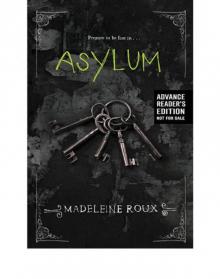 Asylum
Asylum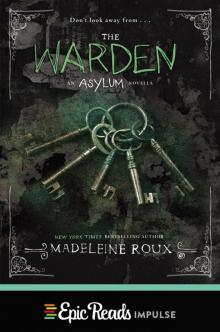 The Warden
The Warden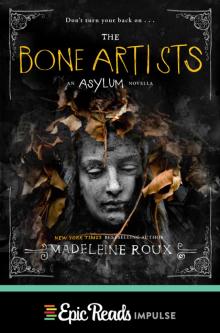 The Bone Artists
The Bone Artists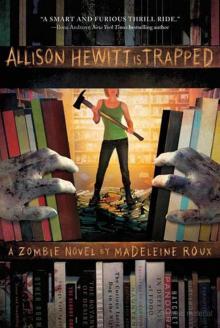 Allison Hewitt Is Trapped
Allison Hewitt Is Trapped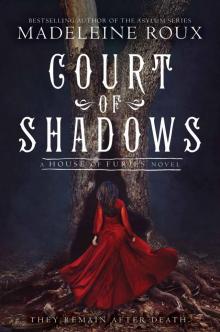 Court of Shadows
Court of Shadows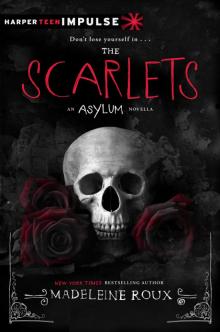 The Scarlets
The Scarlets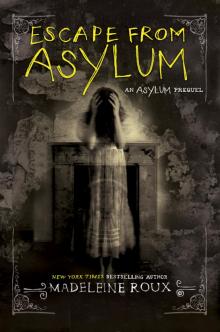 Escape From Asylum
Escape From Asylum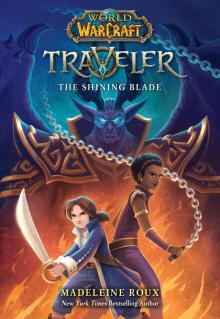 The Shining Blade
The Shining Blade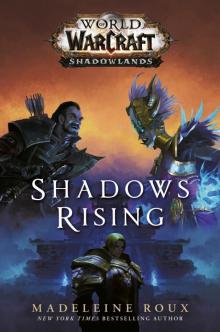 Shadows Rising (World of Warcraft: Shadowlands)
Shadows Rising (World of Warcraft: Shadowlands)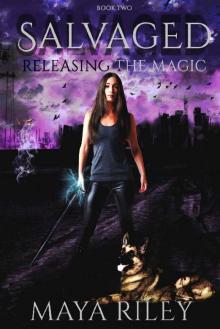 Salvaged
Salvaged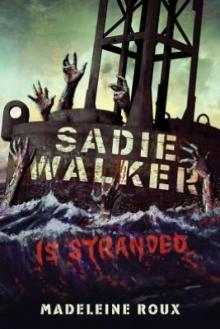 Sadie Walker Is Stranded
Sadie Walker Is Stranded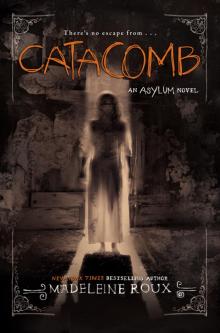 Catacomb
Catacomb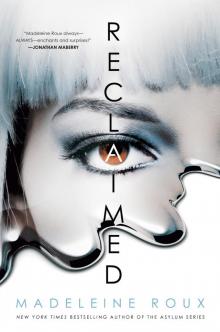 Reclaimed
Reclaimed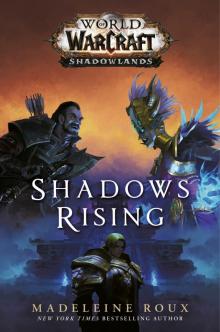 Shadows Rising (World of Warcraft
Shadows Rising (World of Warcraft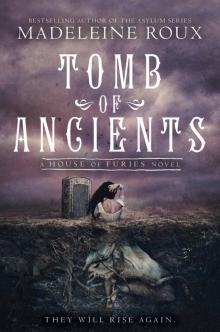 Tomb of Ancients
Tomb of Ancients